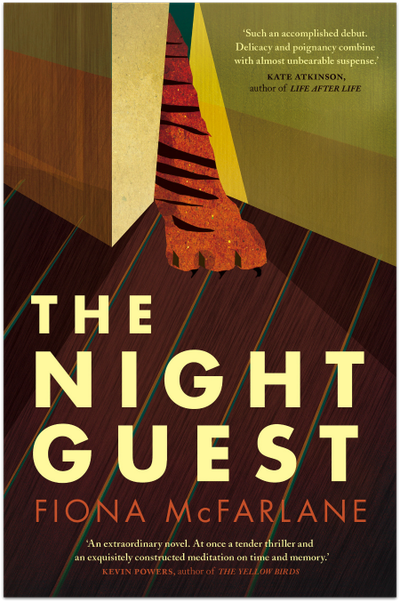Fiona McFarlane talks to Tony Birch about foreboding presences, dignity in ageing and the shifting motif of the tiger in her spellbinding debut novel,
In the first page of this thought-provoking and tender novel, a smelly, noisy and threatening tiger disrupts the sleep of Ruth, an elderly widow at the centre of the story. The large cat turns up in her lounge room in the dead of night: an unusual event in any circumstances, and quite bizarre considering Ruth lives somewhere on the New South Wales coast. Fiona McFarlane, the author of The Night Guest, was first drawn to the motif of the tiger when talking to a friend about the presence of ‘wild animals – lions, crocodiles and particularly tigers … in children’s stories and rhymes and cautionary tales’.
McFarlane does a great deal with her tiger. It variously scares and intrigues Ruth. It also prods her to question her grasp on reality. While we may initially consider that Ruth is more than a little dotty and the tiger represents nothing more than pending senility, as the novel develops it becomes clear that the tiger stands for something more profound. For McFarlane, ‘the presence of the tiger, and Ruth’s reaction to it, comes to measure her changing relationship with reality’. It is not change demeaning of her mental state, but an understanding that change – and ageing – is an organic and inevitable process. ‘I think of the tiger as a messenger, bringing news about the end of things.’

Fiona McFarlane
The intrusion of the tiger is matched by the early arrival of Frida, a woman sent by ‘the government’ to assist Ruth around the house. She provides ‘home-help’: cleaning, cooking and sticking her nose into Ruth’s life as she sees fit. Frida is a mysterious woman. Each time she arrives at Ruth’s home a ‘big yellow taxi’ lurks at the end of the street, driven by her brother, George.
McFarlane has great affection for Frida: ‘I so enjoyed writing her moods and gestures and expressions, and I was interested in the contradictions of her character – the sort of fond brutality with which she treats Ruth. I wanted her to be both comic and terrible.’
The Night Guest is acutely relevant for a contemporary readership, confronting forms of social and emotional change that affect each of us. It would be a rare experience to read this book and not reflect on relationships within our own families and communities, particularly between generations. Ruth lives alone in a beach house with remarkable views of the ocean, and has just her cats and memories for company. Her late husband, Harry, has been dead for several years, and her adult children, while speaking to her regularly by phone, are scattered. When her sons do talk with her, it is in a protective but patronising manner, as one would speak to a child.
When researching and writing the novel, McFarlane considered both the positives and challenges faced by an ageing population. While ‘people are staying healthier longer’, she reflects, the elderly have become increasingly isolated, ‘with younger generations more likely to move far away from home’ and older people experiencing ‘the invisible loneliness of ageing’ in a society that worships youth.
Cover Design for *
*
An elderly widow, living alone and cut off from her family, might be considered a depressing premise for a novel. The Night Guest is far from it. It is rich with emotional reflection, humour and tenderness. In Ruth, McFarlane has created a character of great dignity. We worry over her welfare, and perhaps in an ill-considered manner, like her children, respond protectively towards her. She returns our care for her with a display of quiet courage and daring.
Following the arrival of the tiger and Frida, another character of mystery turns up on Ruth’s doorstep: Richard, aged in his eighties, has returned from her past. Fifty years earlier, Ruth enjoyed a somewhat sheltered but exotic life as a young woman growing up in a missionary family in colonial Fiji. In his youth, Richard was a dashing if emotionally distant suitor who courted Ruth but ultimately (and perhaps inadvertently) deceived her. She never forgot him.
Reunited with Ruth after half a century apart, Richard comes to visit for the weekend. We may be expecting little more than a genteel afternoon tea and a nod-off in front of the television, which would have been more than enough for the increasingly intrusive Frida, who, at the time of Richard’s arrival, has entrenched herself in the household. But Ruth comes into her own on Richard’s arrival. The years have changed him and he’s now emotionally open and receptive. Ruth, perhaps with the knowledge that her life is nearing its end, responds accordingly and without hesitation.
It’s not all that difficult to write bad sex, even when you think you’re doing the opposite. McFarlane, who had a clear objective in mind when contemplating the couple’s reunion, handles the intimacy between Ruth and Richard with grace and beauty. ‘I knew early on that I wanted my main character, an older woman, to experience sexual pleasure, and I knew that it should be practical and surprising, and lovely and a little sad, having found each other after 50 years.’
The Night Guest is a story of love between people, and a love of places – of both the heart and the dirt and sand under our feet. It is also a story that delves into the complex nature of relationships, epitomised, finally, by the drama played out between Ruth and Frida, and its consequences. This mature novel produces a confronting twist in the tail, leaving readers with a great deal to contemplate.
Tony Birch writes short fiction and novels. His books include



